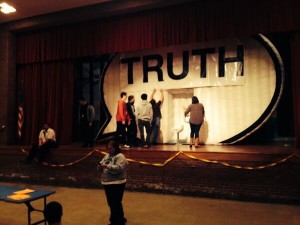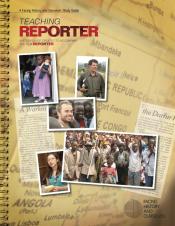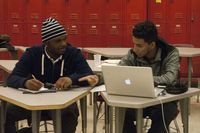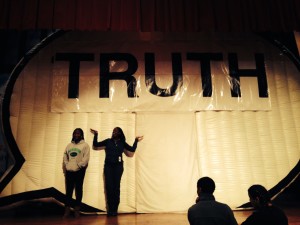Today, Cleveland Facing History students are getting an opportunity to share their truth - whatever it may be - on video as part of a traveling public art display.
 Students at Facing History New Tech High School in Cleveland help set up the Truth Booth on Thursday
Students at Facing History New Tech High School in Cleveland help set up the Truth Booth on ThursdayThe Truth Booth, a project started by three artists affiliated with the San Francisco-based Cause Collective, will stop at Facing History New Tech High School, encouraging students from the school, as well as other New Tech Network and Facing History schools, to stop and think about the truth, and how complicated the concept of "truth" really is.
Launched in 2011 at the Galway Arts Festival in Ireland, the Truth Booth, an inflatable, traveling video studio, lets people crawl inside, press record on a camera, and - in two minutes or under - finish the statement, “The truth is…” The stop in Cleveland is part of a long-term project called "In Search of the Truth," which will bring together the "truths" of people around the world into a finished piece of video artwork.
“There's not one truth, but everything has a collective truth,” Facing History teacher Martha Verde told the Cleveland Metropolitan School District (CMSD) ahead of today's visit. In her classroom, Verde is helping students connect to the Truth Booth project by reading a book called Our America, which follows two African American young men growing up on the South Side of Chicago.
“My purpose is to widen our universe of obligation,” she told CMSD. “The Truth Booth and the study of Our America are perfectly fit for what we do here: We're in one set area and we don't know what other peoples' truths are, what their America is.”
Other classrooms at Facing History New Tech are taking the opportunity to look at how different stakeholders - the media, the public, and the community - hold different truths or different interpretations of a single event. Students studied the 1979 shootings of five anti-Ku Klux Klan members in Greensboro, South Carolina, and compared reactions as well as the stories told - the different versions of truths.
"It requires our students to look at a past event that actually happened, and determine what really happened, ultimately, what is the truth," school Principal Marc Engoglia told CMSD. "Furthermore, it is requiring our students to consider who they are, what they value, where they come from, and where they are going. All of these are strong tenets of Facing History and Ourselves."
Opened in 2012 in partnership with Cleveland Metropolitan School District (CMSD), Facing History and Ourselves, and the New Tech Network, Facing History New Tech High School is the first of its kind in the nation. Students at the school learn through curriculum developed by Facing History and project-based, integrated technology approaches pioneered by the New Tech Network. The school provides a unique opportunity for engaging urban high school students in a program that focuses on civic responsibility, tolerance, and social action.
How do you teach students about the different truths that can surround a single story? Check out some resources that might help you consider the truths we as individuals tell and the truths told by the media, different communities, and groups.
 Teaching REPORTER is a Facing History study guide that accompanies New York Times reporter Nicholas Kristof's documentary Reporter. The guide helps students and teachers look at journalism in a digital age and explores questions like "How do you tell a story that gets people to care about an issue?" "How can words and images be used to inspire people to take action to help others?" and "How can new media be used as a tool for civic participation and social action?" Download a free copy today.
Teaching REPORTER is a Facing History study guide that accompanies New York Times reporter Nicholas Kristof's documentary Reporter. The guide helps students and teachers look at journalism in a digital age and explores questions like "How do you tell a story that gets people to care about an issue?" "How can words and images be used to inspire people to take action to help others?" and "How can new media be used as a tool for civic participation and social action?" Download a free copy today.
- Check out Straightlaced, a video resource that includes interviews with more than 50 teens from diverse backgrounds, all looking at how issues of gender and sexuality impact their adolescence. Facing History network educators can borrow the video from our Lending Library.
 The Facing History and WNYC Radio Rookies project "Neighborhood to Neighborhood" helps students tell their own stories, and the stories about their communities, by building digital media and storytelling skills. Find how-to videos, connection questions, and examples of projects here.
The Facing History and WNYC Radio Rookies project "Neighborhood to Neighborhood" helps students tell their own stories, and the stories about their communities, by building digital media and storytelling skills. Find how-to videos, connection questions, and examples of projects here.
- Little Things Are Big is a favorite Facing History video and text resource that looks at how segregation and ideas about "race" in the 1950s shaped the way Americans in all parts of the nation saw one another as well as the way they saw themselves.
Comment below with your truth! To me, "the truth is....."


